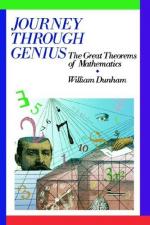
|
| Name: _________________________ | Period: ___________________ |
This quiz consists of 5 multiple choice and 5 short answer questions through The Extraordinary Sums of Leonhard Euler.
Multiple Choice Questions
1. What sum did Euler find for the series?
(a) π²/6
(b) 1.
(c) 2.
(d) The sum was infinite.
2. Which was true of Euclid's number theory?
(a) It has been proven too basic to be useful.
(b) It was proven to the true by Hippocrates.
(c) It was incorrect, as proved by Plato.
(d) It has an impact on modern math.
3. Why did Cardano take an oath to secrecy?
(a) It was the only way he could become a priest,
(b) It was the only way to get Tartaglia's solution to cubic equations.
(c) It was the only way to get his book published.
(d) It was to the only way to win the contest with Fior,
4. What series was Euler most famous for?
(a) 1 + 1/2³ + 1/3³ + 1/4³ . . . 1/k³ . . .
(b) 1 + 1/2 + 1/6 + 1/10 + 1/15 . . .
(c) 1 + 1/2 + 3/4 + 4/5 . . .
(d) 1 + 1/4 + 1/9 + 1/16 . . . + 1/k² . . .
5. Which of the following can not be solved using algebra?
(a) Quintic equation.
(b) Triangulation.
(c) Geometric equation.
(d) Quadratic equation.
Short Answer Questions
1. What was Euclid's definition of a prime number?
2. Which of the following was an important proposition given by Euclid's number theory?
3. Which of the following best describes Cardano's character?
4. Which mathematician was first to take the challenge to solve cubic equations?
5. What is the sum of the series 1 + 1/2³ + 1/3³ + 1/4³ ... 1/k³ . . .?
|
This section contains 264 words (approx. 1 page at 300 words per page) |

|




